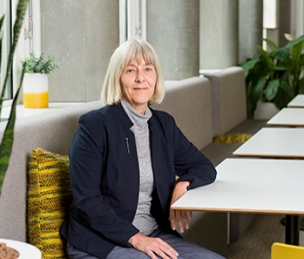Displaying 1 - 19 of 19
-
Bai, F., Meyer, A. S., & Martin, A. E. (2022). The role of transitional probability in cortical tracking of hierarchical linguistic structures. Poster presented at the Experimental Psychology Society (EPS) Meeting, Keele, UK.
-
Bujok, R., Meyer, A. S., & Bosker, H. R. (2022). Beat gestures influence audiovisual lexical stress perception, while visible facial cues do not. Poster presented at the 35th Annual Conference on Human Sentence Processing (HSP 2022), Virtual meeting.
-
Bujok, R., Meyer, A. S., & Bosker, H. R. (2022). Visible lexical stress cues on the face do not influence audiovisual speech perception. Talk presented at Speech Prosody 2022. Lisbon, Portugal. 2022-05-23 - 2022-05-26.
-
Bujok, R., Peeters, D., Meyer, A. S., & Bosker, H. R. (2022). Do manual beat gestures recalibrate the perception of lexical stress?. Talk presented at the Psychonomic Society - 63rd Annual Meeting. Boston, USA. 2022-11-17 - 2022-11-20.
-
Bujok, R., Meyer, A. S., & Bosker, H. R. (2022). Not all visual cues to lexical stress affect audiovisual speech perception: beat gestures vs. articulatory cues. Poster presented at IMPRS Conference 2022, Virtual meeting.
-
Bujok, R., Peeters, D., Meyer, A. S., & Bosker, H. R. (2022). Recalibration of lexical stress perception can be driven by visual beat gestures. Talk presented at the Dag van de Fonetiek 2022. Utrecht, NL. 2022-12-16 - 2022-12-16.
-
Hintz, F., Voeten, C. C., McQueen, J. M., & Meyer, A. S. (2022). Quantifying the relationships between linguistic experience, general cognitive skills and linguistic processing skills. Talk presented at the 44th Annual Meeting of the Cognitive Science Society (CogSci 2022). Toronto, Canada. 2022-07-27 - 2022-07-30.
-
Hintz, F., McQueen, J. M., & Meyer, A. S. (2022). The principal dimensions of speaking and listening skills. Talk presented at the 22nd Conference of the European Society for Cognitive Psychology (ESCOP 2022). Lille, France. 2022-08-29 - 2022-09-01.
-
Hustá, C., Nieuwland, M. S., & Meyer, A. S. (2022). Capturing the attentional trade-off between speech planning and comprehension: Evidence from the N100. Poster presented at the IMPRS Conference 2022, Nijmegen, the Netherlands.
-
Hustá, C., Nieuwland, M. S., & Meyer, A. S. (2022). Electrophysiological signatures of speech planning during comprehension. Poster presented at the 18th NVP Winter Conference on Brain and Cognition, Egmond aan Zee, The Netherlands.
-
Meyer, A. S. (2022). The art of conversation [Broadbent lecture]. Talk presented at the 22nd Conference of the European Society for Cognitive Psychology (ESCOP 2022). Lille, France. 2022-08-29 - 2022-09-01.
-
Meyer, A. S. (2022). Timing in conversation. Talk presented at the Symposium of the Social Sciences and Humanities Section of the Max Planck Society. Berlin, Germany. 2022-06-21.
-
He, J., Meyer, A. S., Creemers, A., & Brehm, L. (2022). How to conduct language production research online: A web-based study of semantic context and name agreement effects in multi-word production. Poster presented at the 18th NVP Winter Conference on Brain and Cognition, Egmond aan Zee, The Netherlands.
-
Slaats, S., Weissbart, H., Schoffelen, J.-M., Meyer, A. S., & Martin, A. E. (2022). Sentential embedding modulates the low-frequency neural response to words. Poster presented at the 18th NVP Winter Conference on Brain and Cognition, Egmond aan Zee, The Netherlands.
-
Takashima, A., Hintz, F., McQueen, J. M., Meyer, A. S., & Hagoort, P. (2022). The neuronal underpinnings of variability in language skills. Talk presented at the 22nd Conference of the European Society for Cognitive Psychology (ESCOP 2022). Lille, France. 2022-08-29 - 2022-09-01.
-
Uluşahin, O., Bosker, H. R., McQueen, J. M., & Meyer, A. S. (2022). Both contextual and talker-bound F0 information affect voiceless fricative perception. Talk presented at De Dag van de Fonetiek. Utrecht, The Netherlands. 2022-12-16.
-
Bosker, H. R., Meyer, A. S., & Maslowski, M. (2020). When speech cues are not integrated immediately: Evidence from the global speech rate effect. Poster presented at the 26th Architectures and Mechanisms for Language Processing Conference (AMLap 2020), Potsdam, Germany.
-
Zormpa, E., Meyer, A. S., & Brehm, L. (2020). Communicative intentions influence memory for conversations. Poster presented at the 26th Architectures and Mechanisms for Language Processing Conference (AMLap 2020), Potsdam, Germany.
-
Zormpa, E., Meyer, A. S., & Brehm, L. (2020). Answers are remembered better than the questions themselves. Poster presented at the Experimental Psychology Society (EPS) Meeting, Kent, Canterbury.
Abstract
When we communicate, we often use language to identify and successfully transmit new information. We can highlight new and important information by focussing it through pitch, syntactic structure, or semantic content. Previous work has shown that focussed information is remembered better than neutral or unfocussed information. However, most of this work has used structures, like clefts and pseudo-clefts, that are rarely found in communication. We used spoken question-answer pairs, a frequent structure where the answers are focussed relative to the questions, to examine whether answers are remembered better than questions. On each trial, participants (n=48) saw three pictures on the screen while listening to a recorded question-answer exchange between two people, such as “What should move under the crab? – The sunflower!”. In an online Yes/No recognition memory test on the next day, participants recognised the names of pictures that appeared as answers 6% more accurately than the names of pictures that appeared as questions (β = 0.27, Wald z = 4.51, 95% CI = 0.15, 0.39, p = < 0.001). Thus, linguistic focus affected memory for the words of an overheard conversation. We discuss the methodological and theoretical implications of the findings for studies of conversation.Additional information
https://osf.io/w72r4/

Share this page